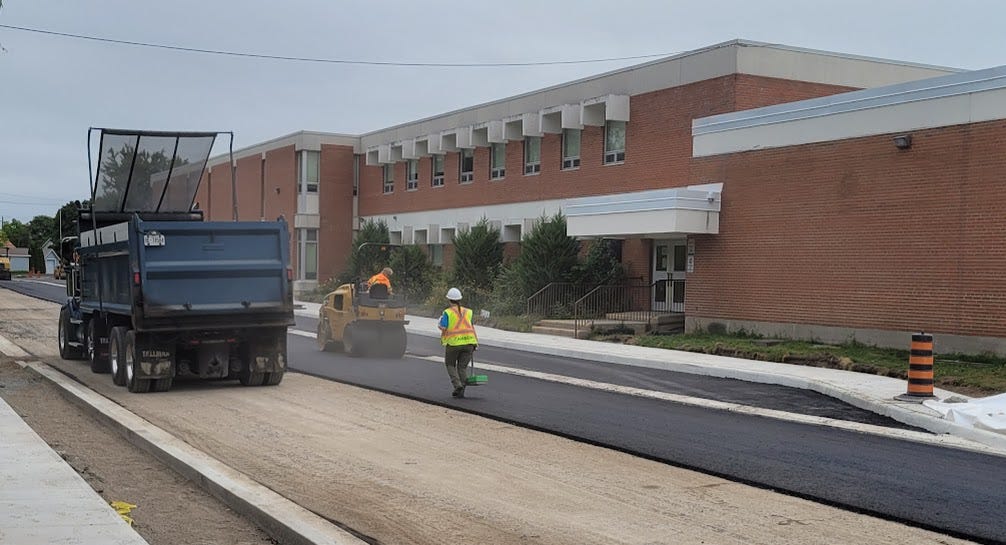Ford wants teachers to change student behaviour
Strict cellphone ban in high school comes into force on Tuesday

The Ford government wants teachers to change the behaviour of the students in their classrooms, so the children and teens pay more attention to learning.
“This new initiative is a culture change that's happening in our classrooms,” Education Minister Jill Dunlop told a news conference on Thursday.
Good luck with that, say many parents who have experienced the challenge of dealing with their own children and trying to alter their behaviour. (Yes, including me.)
Of course, the issue this time is cellphones. The scourge of our existence that most of us, including our youngsters, cannot live without.
Dunlop, who just became education minister just two weeks ago, is a parent and former college-level instructor, so she outlined the problems she’s seen.
“Cellphones are distracting,” she said. “Students are looking at social media and they're texting each other. They're not paying attention to what's being taught in class.”
To deal with this problem, Ontario has brought in what many observers say are the toughest rules in Canada. They will be in place when students show up on Tuesday and the province is using social media and print ads this weekend to let parents and students know about the new regulations. (I’m not sure the Conservatives understand the irony of using social media to get their message out on this topic, no reporter asked Dunlop about it.)
The rules are tougher for elementary students, too.
“To help ensure focused and engaging learning environments, all personal mobile devices must be stored out of view during the school day (elementary) or during instructional time (secondary),” says Jaine Klassen Jeninga, trustee for our area and chair of the Kawartha Pine Ridge District School Board.
This includes smart watches and tablets, the province says.
“Students up to Grade 8 may not use mobile devices anytime during the school day (including recess), except for approved purposes,” Jeninga said. “Students in Grades 9-12 may use mobile devices during breaks, and when use is allowed by an educator.”
The Kawartha board also plans to communicate directly with parents to ensure they understand the new reality and its impact on students.
“Schools will be working with students and families to educate and support them as they adjust to these expectations in the coming days,” Jeninga said.
Cellphones will be permitted in certain circumstances such as for medical purposes, to support special-education needs, or for educational purposes, as directed by a teacher.
If a student does not follow a teacher's instruction to put their phone away, they will be asked to put the device in a "safe space" in the classroom, Dunlop said.
If the student still does not comply, she said they and their phone will be sent to the principal's office.
"Students are in the classroom to learn and teachers deserve that respect of students [being there] listening and learning" she said.
The government also announced it is cracking down on vaping and vaping products.
“It has been our long-standing policy that smoking and vaping are not allowed on board property or in schools,” Jeninga said.
The new provincial directives say, “students cannot bring electronic cigarettes (vapes), cannabis, tobacco and/or nicotine products to school (including on school transportation),” she added.
The details of the provincial code of conduct are set out here.
The province is spending $30 million to install vape detectors and other security upgrades in schools. It is also spending $17.5 million on supports for student mental health and parent engagement, including $15 million to help at risk of addictive behaviours.
Asked what other major issue she sees for schools; Dunlop identified the continuing shortage of teachers.
New reading tests
At its board meeting in June, Kawartha Pine Ridge Education Director Rita Russo said that in September 2024 “all Kindergarten to Grade 2 students will be screened for reading risks.”
Results will be communicated to families on the first term report card, with earlier contact for students who have been identified as being at risk.
French begins immersion at Hillcrest
French immersion is being established at Hillcrest Public School with Senior Kindergarten to Grade 1 students being eligible to enrol in the program.
Each year thereafter the subsequent grade will be introduced. The 2024-2025 Grade 2 students will still be eligible to enrol in the existing extended French program for their Grade 5 year. Extended French will be phased out by 2031.


